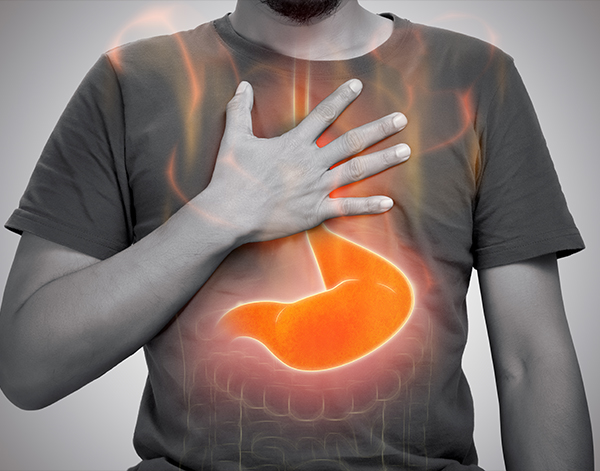Thanksgiving and GERD: Tips for Before, During, and After the Meal
 After the cocktails, after the appetizers, after the turkey, potatoes, and all of those sides. And, finally, after the pie (three kinds) – this is when many people must digest the consequences of a Thanksgiving feast.
After the cocktails, after the appetizers, after the turkey, potatoes, and all of those sides. And, finally, after the pie (three kinds) – this is when many people must digest the consequences of a Thanksgiving feast.
For the one in five Americans who live with the symptoms of gastroesophageal reflux disease, or GERD, those consequences extend beyond a stretched belly. For GERD sufferers, the Thanksgiving table is a landmine of burning discomfort.
But there are ways around those landmines, thankfully. Following are some pointers on how to determine if you have GERD or occasional acid reflux, and a few happy Thanksgiving preparation tips if you do have GERD.
The Difference Between Acid Reflux and GERD
Acid reflux occurs when your stomach’s contents back up into your food pipe (esophagus), causing heartburn or indigestion. Most people experience reflux-related heartburn now and then.
GERD is a more serious form of acid reflux because it is chronic. It signals that the closure between your esophagus and stomach is weak or malfunctioning. It might relax when it shouldn’t, for example.
Typically, people who experience acid reflux more than twice a week with severe symptoms have GERD.
GERD symptoms include:
- Burning in your chest, neck, and/or throat (heartburn)
- Chest pain
- Chronic sore throat and/or cough (including wheezing and hoarseness)
- Persistent burping
- Bad breath
- Difficulty swallowing
- Damaged tooth enamel
- Nausea and vomiting
In severe cases of GERD, acid reflux can cause inflammation, bleeding, ulcers, and trouble swallowing (dysphagia). Severe GERD also can develop into a rare but serious condition called Barrett’s esophagus, a tissue abnormality that requires medical care.
Setting a GERD-Avoiding Thanksgiving Table
If you have been diagnosed with GERD or experience the above symptoms, you should consider these precautions as you approach your Thanksgiving celebration.
Before the meal
- Choose comfortable clothing—To ease food’s passage, wear a loose-fitting outfit that does not squeeze your belly and lower esophagus.
- Drink mocktails—Alcohol can worsen GERD, so try to avoid it before and during the meal. Mix an alcohol-free drink or try one of the many non-alcoholic wines and beers in stores. If you can’t resist one cocktail, opt for just a splash of alcohol.
During the meal
- Tweak the menu – Common GERD triggers include acidic foods (like citrus and tomatoes), fatty meats, fried foods, onions, garlic, cheese, and coffee. Animal fats can slow digestion, which can contribute to reflux. You can substitute some of your Thanksgiving dishes with these pain-free alternatives:
- White meat turkey (lower in fat).
- Baked potatoes seasoned with olive oil or low-fat yogurt rather than mashed potatoes, which tend to be mixed with a lot of cream and fats.
- Salad with celery and/or fennel. Mild foods like lettuce and celery are easy on your stomach, and fennel is low in acid, which can relieve GERD symptoms.
- Roasted root veggies like carrots, turnips, and parsnips in olive oil – without onions and garlic.
- Replace cranberry sauce, which is acidic, with applesauce.
- Dressing that’s been baked outside of the turkey (less fat). Consider adding fiber-rich brown rice to the dressing.
- A slice of pumpkin pie that’s naked or dressed with low-fat dairy – ice cream, whipped cream, or vanilla yogurt.
- Serve yourself a little less of each – Smaller portions might keep your GERD symptoms at bay.
- Eat slowly and thoughtfully – Make it a habit to set your fork down after every bite and then chew slowly. Think about the taste and texture of the food. Once you’ve swallowed a bite, then pick up your fork and take another.
After the meal
- Walk, don’t nap – Sleeping immediately after eating can aggravate GERD because your stomach is still digesting. After the dishes are cleared, suggest a walk or football toss.
- Keep your head up – When it is time to sleep (two to three hours after your last serving), elevate your head slightly to allow gravity to reduce reflux. Wedge pillows are specifically designed for this purpose.
When You Should Consider GERD Treatments
In many cases, GERD can be managed with diet modifications, exercise, and healthy weight management. However, if your symptoms persist, consider talking to a gastroenterologist about medications that can reduce or block acid production, as well as other treatments.
In fact, you might want to consider talking to a doctor about treatments and precautions before the appetizers, the turkey, and the pie. It could ensure a better night’s sleep on Thanksgiving Thursday, and a more active Black Friday.
For additional guidance on what to eat through the holidays, visit our blog on digestion-friendly celebratory tips. You can learn more about GERD symptoms and treatments, and watch an instructive video, on our website.

